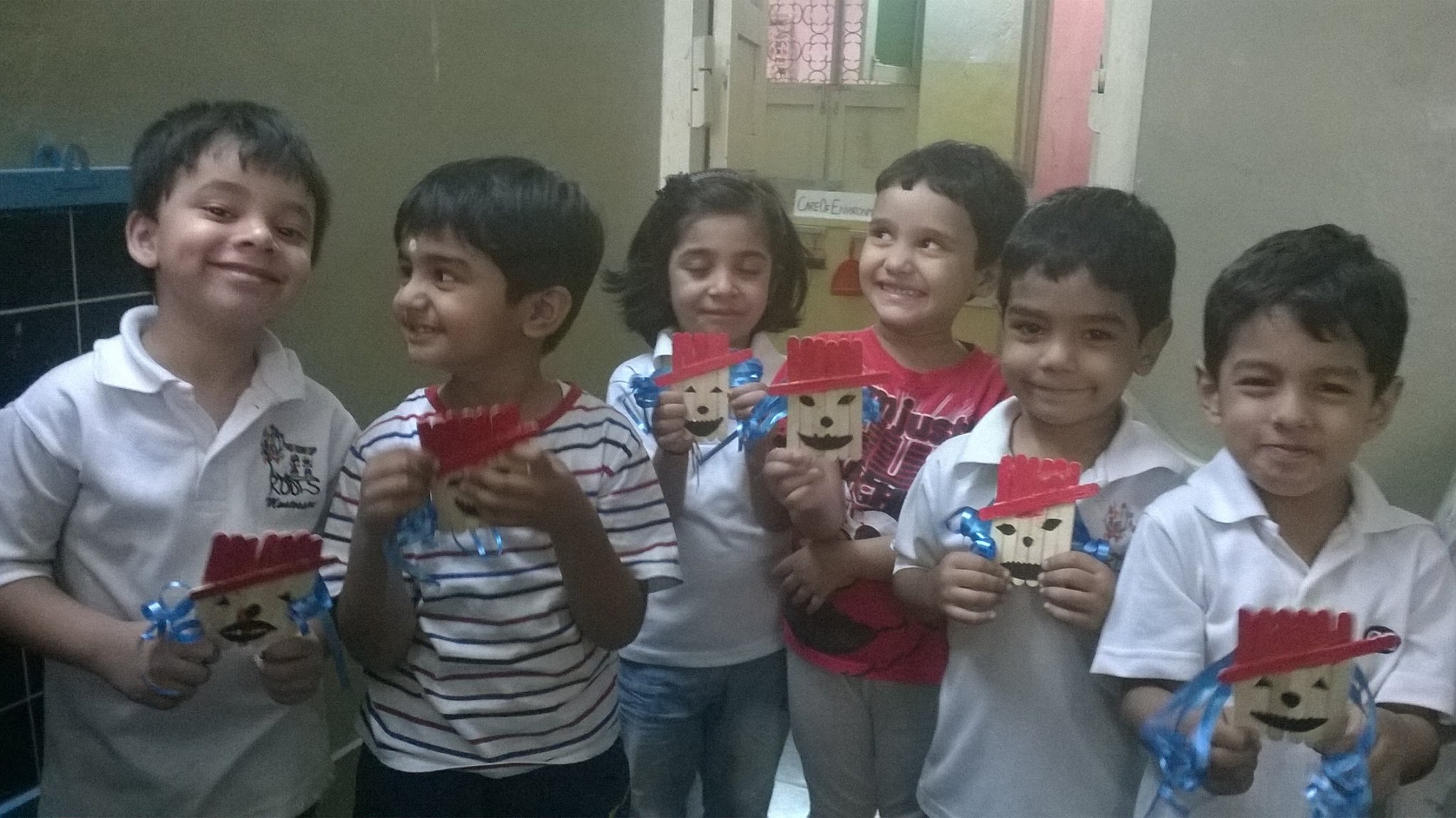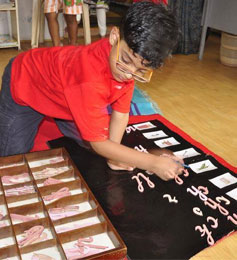“… education is a natural process carried out by the human individual, and is acquired not by listening to words, but by experiences in the environment.” – Maria Montessori.
Dr. Montessori has given us this contemporary philosophy and a scientifically defined process. The Montessori method is based on the premise of multi-year cycle. This cycle begins when a child enters the Primary classroom at age two and is completed when a child finishes his/her kindergarten year. The goal of early childhood education, therefore, should be to cultivate the child’s own natural instinct to learn. In the Montessori classroom, this goal is achieved by allowing the child to experience the thrill of learning by choice rather than force while at the same time encouraging the child to perfect his or her own skills, so that the child can take full advantage of future learning situations.

ACHIEVEMENTS at Fresh Roots Montessori House of Children
-
Strong academics 2.Confidence 3.Self discipline 4.Responsibility 5.Leadership 6.Initiative 7.Innovation 8.Divergent thinking and
A Life Time Live of Learning
The basic tenets of the method need to be shared for the perception of science as well as the logic of this process of preparing the child for the world. It is a wrong notion that Montessori is another name for a nursery or a play school. The common assumption is that whatever the child does is PLAY. But play is to move around aimlessly without any expected or needed result. WORK on the other hand is an activity in which one exerts strength of the faculties to perform something and achieve an objective. Planned morning exercises, yoga, silence exercises, imaginative talk and walking on the line followed by a moral story awakens the mind and makes the child enthusiastic about learning and more receptive.
What is Required is an Environment Full of Activities to Unlock your Child’s Full Potential. The areas of:
1.Exercises of Practical Life,
2.Sensorial,
3.Language, and
4.Mathematics
These 4 areas make up the central “core” of the Montessori curriculum. Together they support the child’s ability to express and think with clarity as he/she adapts to the world around him/her. Special activities like the morning exercises and walking on the line help them for coordination and concentration.
I. Practical Life lessons promote the concepts of:
1. Caring for Oneself,
2.Caring for others and
3.Caring for the Environment.
Activities in this area of the classroom include many of the tasks that children see done in their own home environment, like preparing food, washing , cleaning etc, along with exercises of Grace and Courtesy. Through the self-care exercises, the children develop confidence and independence. Control and Co-ordination of their movements is developed, as well as their powers of control and concentration. They also learn the habit of working at a task from beginning to end
II. The Sensorial Exploration area of the classroom develops the ability of the child to perceive and understand the world through the senses. Children learn to order and classify their environment by touching, feeling, smelling, seeing, listening, tasting and exploring the physical properties of their environment. Dr. Montessori understood and embraced the words of Aristotle, “”There is nothing in the intellect which was not first in the senses.”
III. The Primary Language classroom is rich in conversation, stories, and song. Sandpaper letters recognize the child’s need for a tactile expression of a sound and provide the means for the child to link sound and symbol naturally, encouraging the development of written expression and reading skills. Geography, Biology, Botany, Zoology, Art and Music are presented as extensions of the sensorial and language art activities. Children learn about people and cultures of other countries and come to feel connected to the greater world around them.
IV. Arithmetic activities rely on the use of concrete materials that the children can manipulate themselves. The children are given a solid understanding of basic and complex mathematical principles, which prepares them for later abstract reasoning and problem-solving. The children at such a young age learn the tables till 12 without any difficulty. They get thorough knowledge of addition, subtraction and multiplication.
Through the lessons in each of these areas, the children learn to perfect their coordination, to increase their independence, to develop their span of concentration, to classify and organize all types of information, and to read and write with a joy that motivates them to constantly improve their skills.
During the three years each student is moving through the Montessori curriculum is also simultaneously developing the social, physical and emotional skills, as well as the self-discipline, that go hand-in-hand with the academics in a Montessori classroom at Fresh Roots.

Much of what a Montessori child is exposed to through observing the older students is part of what motivates the younger children to challenge themselves so that they will someday be able to do the work of the older child. Therefore, the final year of the primary cycle, the kindergarten year, is the most important. This is the period during which everything comes together for the child: it is the culmination of two or three years of developing into kind, resourceful, self-directed students who then lead the class and set an example for the younger students.
The education experience at Fresh Roots involves hands on training, self-paced, collaborative, challenging and joyful learning, encourages divergent thinking instead of convergent thinking and innovation instead of standardization. There are no grades, no tests, no classrooms and no home works and finally no class teachers. The Special Kids are also integrated and have an experiential learning with Montessori equipment and outdoor visits.
By Mrs. Keerti Jaiswal
Director
Fresh Roots Montessori House of Children
Masab Tank,
Hyderabad, Telangana.
+91 9849275222 / 040 23345222
Suggested for you
Montessori Approach to Early Childhood
Montessori vs.Waldorf-Approach
Pre-Schooling Boosts Brain Development